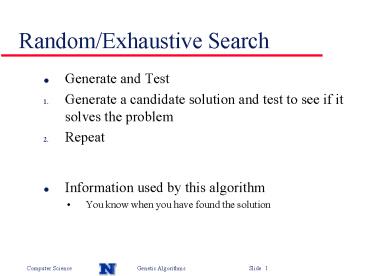RandomExhaustive Search - PowerPoint PPT Presentation
Title:
RandomExhaustive Search
Description:
Generate a candidate solution and test to see if it solves the problem. Repeat ... while (partsum rand && i popsize - 1) ; return i; ... – PowerPoint PPT presentation
Number of Views:44
Avg rating:3.0/5.0
Title: RandomExhaustive Search
1
Random/Exhaustive Search
- Generate and Test
- Generate a candidate solution and test to see if
it solves the problem - Repeat
- Information used by this algorithm
- You know when you have found the solution
2
Hill Climbing
- Generate a candidate solution by modifying the
last solution, S - If the new solution, N, is better than S then
S N - Repeat
- Local Search
- Information used by this algorithm
- Compare two candidate solutions and tell which is
better
3
Population of Hill Climbers
- Randomly generate initial population of hill
climbers (Randomly generate initial candidate
solutions) - Do hill climbing in parallel
- After time t, choose best solution in population
- Information used by this algorithm
- Same as hill climbing
4
Genetic Algorithms
- Population of information exchanging hill
climbers - Concentrates resources in promising areas of the
search space - Information used
- Same as hillclimbing
5
Hard problems
- Computational complexity, problem size n
- Binary Search O(log(n))
- Linear Search O(n)
- Bubble Sort O(n2)
- Scheduling NP-complete
(at least exponential
O(an)
6
Hard problems
- Poorly defined
7
Search as a solution to hard problems
- Strategy generate a potential solution and see
if it solves the problem - Make use of information available to guide the
generation of potential solutions - How much information is available?
- Very little We know the solution when we find it
- Lots linear, continuous,
- Modicum Compare two solutions and tell which is
better
8
Search tradeoff
- Very little information for search implies we
have no algorithm other than RES. We have to
explore the space thoroughly since there is no
other information to exploit - Lots of information (linear, continuous, ) means
that we can exploit this information to arrive
directly at a solution, without any exploration - Modicum of information (compare two solutions)
implies that we need to use this information to
tradeoff exploration of the search space versus
exploiting the information to concentrate search
in promising areas
9
Exploration vs Exploitation
- More exploration means
- Better chance of finding solution (more robust)
- Takes longer
- More exploitation means
- Less chance of finding solution, better chance of
getting stuck in a local optimum - Takes less time
10
Choosing a search algorithm
- The amount of information available about a
problem influences our choice of search algorithm
and how we tune this algorithm - How does a search algorithm balance exploration
of a search space against exploitation of
(possibly misleading) information about the
search space? - What assumptions is the algorithm making?
11
Genetic Algorithm
- Generate pop(0)
- Evaluate pop(0)
- T0
- While (not converged) do
- Select pop(T1) from pop(T)
- Recombine pop(T1)
- Evaluate pop(T1)
- T T 1
- Done
12
Genetic Algorithm
- Generate pop(0)
- Evaluate pop(0)
- T0
- While (not converged) do
- Select pop(T1) from pop(T)
- Recombine pop(T1)
- Evaluate pop(T1)
- T T 1
- Done
13
Generate pop(0)
Initialize population with randomly generated
strings of 1s and 0s
for(i 0 i lt popSize i) for(j 0
j lt chromLen j) Popi.chromj
flip(0.5)
14
Genetic Algorithm
- Generate pop(0)
- Evaluate pop(0)
- T0
- While (not converged) do
- Select pop(T1) from pop(T)
- Recombine pop(T1)
- Evaluate pop(T1)
- T T 1
- Done
15
Evaluate pop(0)
Evaluate
Fitness
Decoded individual
Application dependent fitness function
16
Genetic Algorithm
- Generate pop(0)
- Evaluate pop(0)
- T0
- While (T lt maxGen) do
- Select pop(T1) from pop(T)
- Recombine pop(T1)
- Evaluate pop(T1)
- T T 1
- Done
17
Genetic Algorithm
- Generate pop(0)
- Evaluate pop(0)
- T0
- While (T lt maxGen) do
- Select pop(T1) from pop(T)
- Recombine pop(T1)
- Evaluate pop(T1)
- T T 1
- Done
18
Selection
- Each member of the population gets a share of the
pie proportional to fitness relative to other
members of the population - Spin the roulette wheel pie and pick the
individual that the ball lands on - Focuses search in promising areas
19
Code
int roulette(IPTR pop, double sumFitness, int
popsize) / select a single individual by
roulette wheel selection / double
rand,partsum int i partsum 0.0 i 0
rand f_random() sumFitness i -1
do i partsum popi.fitness
while (partsum lt rand i lt popsize - 1)
return i
20
Genetic Algorithm
- Generate pop(0)
- Evaluate pop(0)
- T0
- While (T lt maxGen) do
- Select pop(T1) from pop(T)
- Recombine pop(T1)
- Evaluate pop(T1)
- T T 1
- Done
21
Crossover and mutation
Mutation Probability 0.001 Insurance
Xover Probability 0.7 Exploration operator
22
Crossover code
void crossover(POPULATION p, IPTR p1, IPTR p2,
IPTR c1, IPTR c2) / p1,p2,c1,c2,m1,m2,mc1,mc2
/ int pi1,pi2,ci1,ci2 int xp, i pi1
p1-gtchrom pi2 p2-gtchrom ci1
c1-gtchrom ci2 c2-gtchrom
if(flip(p-gtpCross)) xp rnd(0, p-gtlchrom -
1) for(i 0 i lt xp i) ci1i
muteX(p, pi1i) ci2i muteX(p,
pi2i) for(i xp i lt p-gtlchrom
i) ci1i muteX(p, pi2i)
ci2i muteX(p, pi1i) else
for(i 0 i lt p-gtlchrom i) ci1i
muteX(p, pi1i) ci2i muteX(p,
pi2i)
23
Mutation code
int muteX(POPULATION p, int pa) return
(flip(p-gtpMut) ? 1 - pa pa)































